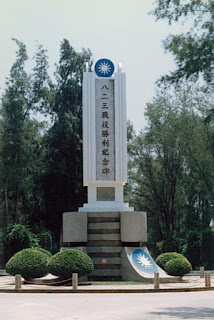 |
| http://city.udn.com/65094/4104165 |
The best narration of this legend I found came from a soldier who was once stationed in Kinmen. According to the soldier, his story came from an elderly store owner who ran a general store in Qingli Village. For the 60 years he lived, the old store owner stayed on Kinmen. Hence, he knew everything about Kinmen and is well versed with its many ghost stories.
One day, the soldier, who already know a little about the story, pestered the old store owner to tell him more on the Nanshan company. The store owner was at first reluctant but eventually gave in. "Well, I guess it is a firsthand experience", he sighed.
The story began in 1958, not long after the Second Taiwan Strait Crisis. Special Forces from both the ROCAF (Republic of China Armed Forces) and the PLA were constantly crossing the strait to sneak up on one another. During this time, a company of ROCAF soldiers was stationed in Nanshan hills, not too far away from Qingli village.
At the time, the store owner made a living doing the laundries of this company of soldiers. One morning, the store owner was following his routine and went to the barracks to return their clothes. Surprisingly, no one was there at the entrance to greet him. He knew something was wrong right away. Specifically, the sentries were not on duty. He went inside the living quarters, and there, he saw the whole company of soldiers, with their throat slit, lying dead in a pool of blood. He hurriedly went for help.
For a short time after, when the company had been wiped out, there were no soldiers stationed in Nanshan hills. However, the villagers continued to hear soldiers marching at night. Eventually, some curious villagers went to explore the barracks at night. There they saw a whole company of headless soldiers marching in full uniform. The stories about the sighting ran rampant around the islands. Not long after, the army sent priests to exorcise these men. However, exorcisms never worked. Villagers still heard ghost soldiers marching every night. Naturally, no one dared to fill the vacuum in the barracks.
According to the priests who tried exorcising the soldiers, the soldiers were ashamed for having their whole company wiped out by the enemies. Hence, they decided that if they could defend their position in life, they would do so in death. The ROCAF sent ranked officers to convince the soldiers to leave. They first tried a major, colonel and then a commander, however, the ghost soldiers would not heed to them.
 |
| http://city.udn.com/65094/4104165 |
"Afterall, Chiang is the highest ranked officer in the country" the old store owner ended his story.
Some time ago, Taiwan television made a coverage about the story. Apparently, the tale is quite a phenomenon to local Kinmen residents.
There were reliable sources stating this story is true. Specifically, there was no evidence indicating that a whole ROCAF company were completely annihilated at Nanshan hills. Moreover, there was a nationalistic tone behind the story. Making it seems like propaganda.
No matter what the case is, the scars of war in Kinmen were clearly seemingly preserved through this story.
No comments:
Post a Comment